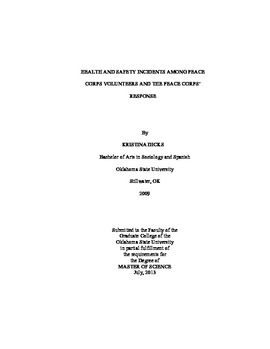| dc.contributor.advisor | Perkins, Stephen M. | |
| dc.contributor.author | Dicks, Kristina Leigh | |
| dc.date.accessioned | 2014-09-24T14:18:30Z | |
| dc.date.available | 2014-09-24T14:18:30Z | |
| dc.date.issued | 2013-07-01 | |
| dc.identifier.uri | https://hdl.handle.net/11244/11154 | |
| dc.description.abstract | Every year thousands of Americans leave the country to begin service with the Peace Corps. Hundreds of Peace Corps Volunteers will return every year because of health conditions that could not be treated in the host country. Returned Peace Corps Volunteers with lasting health conditions face challenges in obtaining service related benefits that have not previously been studied. In the last several years, Peace Corps' treatment of Volunteers' health and safety concerns in their country of service has come to public attention with several highly publicized examples, yet no research has been undertaken to better explain these issues.This study is a phenomenological investigation of the shared experience of returned Peace Corps Volunteers who suffered a health issue as a result of their service and attempted to work with the Peace Corps to resolve their conditions. This research was undertaken to illustrate the experiences of these RPCVs in an effort to derive meaning from the researchers' own experience with the issue. Though the participants of this study come from widely differing backgrounds, having served in different regions, at different times and at different ages, there were six themes identified as being shared among the participants. First, the participants all faced inadequate insurance coverage upon their return to the US. Second, at some point in their service, the health issue was redirected to the Volunteer, as if he or she were responsible. Third, when the participants attempted to contact Peace Corps staff for assistance, the response was mostly unhelpful. Fourth, outside parties like other PCVs, host country nationals, or friends and family were usually necessary to be successful in obtaining help from the Peace Corps system. Fifth, the participants experienced much confusion as to the process for applying for benefits or using their Peace Corps approved health insurance. Finally, despite the difficulties, each participant felt a sense of loyalty to the Peace Corps mission and expressed a feeling of satisfaction in their service. RPCVs face significant challenges in working within the Peace Corps system to treat health issues obtained during service. More research is needed to help identify where breakdowns are occurring that lead to such difficulties. | |
| dc.format | application/pdf | |
| dc.language | en_US | |
| dc.publisher | Oklahoma State University | |
| dc.rights | Copyright is held by the author who has granted the Oklahoma State University Library the non-exclusive right to share this material in its institutional repository. Contact Digital Library Services at lib-dls@okstate.edu or 405-744-9161 for the permission policy on the use, reproduction or distribution of this material. | |
| dc.title | Health and Safety Incidents Among Peace Corps Volunteers and the Peace Corps' Response | |
| dc.type | text | |
| dc.contributor.committeeMember | Caniglia, Beth Schaefer | |
| dc.contributor.committeeMember | Mix, Tamara | |
| osu.filename | Dicks_okstate_0664M_12925.pdf | |
| osu.accesstype | Open Access | |
| dc.description.department | International Studies | |
| dc.type.genre | Thesis | |
